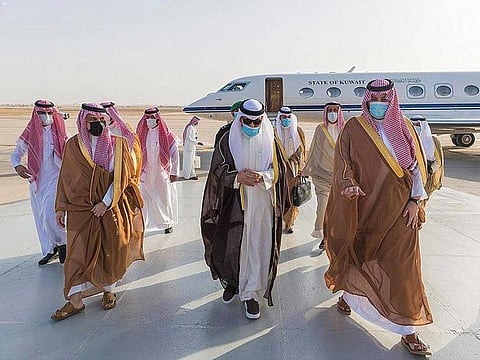Gulf capitals witness active diplomatic moves
Kuwait foreign minister arrives in Riyadh, delivers message to King Salman

Abu Dhabi: The Gulf region has been witnessing hectic diplomatic activity over the past two weeks, with a number of leaders exchanging verbal and written messages. Envoys of Kuwait and Oman were the most active, as also the Qatari envoy.
Kuwaiti Foreign Minister Shaikh Ahmad Nasser Al Sabah arrived in Saudi Arabia on Wednesday for a short visit.
The Kuwaiti envoy delivered a written message to the Saudi King Salman bin Abdulaziz from Emir of Kuwait, Shaikh Sabah Al Ahmad Al Jaber Al Sabah.
The Kuwaiti envoy also conveyed a verbal message to Prince Mohammed bin Salman, Crown Prince, Deputy Prime Minister and Saudi Minister of Defence, from the Emir of Kuwait, during his talks with Prince Turki bin Mohammed bin Fahd, Minister of State, member of the Saudi Cabinet.
The Kuwaiti news agency said that the message relates to the strong relations between the two countries and the prospects for strengthening and developing them in various fields, and a number of issues of common interest.
The recent weeks witnessed active diplomatic moves in most of the Gulf capitals, in addition to exchanging phone calls between Gulf leaders that came with congratulations on the advent of Eid Al Fitr.
On May 10, the Kuwaiti Minister, Shaikh Ahmad Nasser Al Sabah, delivered a message to the Emir of Qatar, Shaikh Tamim Al Thani, and the Kuwaiti news agency said that it relates to the brotherly and steadfast relations between the two countries and the prospects for strengthening and developing them, in addition to issues of common concern.
Five days later, Yussuf Bin Alawi Bin Abdullah, Oman’s minister responsible for foreign affairs, conveyed a message from Sultan Haitham Bin Tariq, Sultan of Oman, to the Emir of Kuwait, Shaikh Sabah Al Ahmad Al Jaber Al Sabah, delivered by the Omani minister to Shaikh Sabah Al Khaled Al Sabah, Kuwait’s Prime Minister. According to a report by the official news agency, the officials reviewed bilateral relations between the two countries, in addition to issues of common concern.
Minister Yussuf Bin Alawi visited Qatar on May 18, conveying a message from Sultan Haitham, which according to the official news agency “related to the fraternal relations between the two countries and ways of strengthening them as well as the most prominent regional and international issues of common concern”.
On May 21, the Sultan of Oman Haitham Bin Tariq received Mohammed Bin Abdul Rahman Al Thani, Qatar’s Deputy Prime Minister and Minister of Foreign Affairs.
The official Omani news agency said that the Qatari minister conveyed the greetings of the Emir of Qatar, Sheikh Tamim Bin Hamad Al Thani, hours after the latter received a call from the Sultan of Oman.
The meeting and the phone calls were also preceded by a verbal message received by the Emir of Qatar, on May 18, from the Sultan of Oman, as part of the active Gulf diplomatic moves witnessed in recent weeks.
The Gulf messages coincide with the 39th anniversary of the Gulf Cooperation Council.
Secretary-General Nayef Al Hajraf has said the GCC is facing unprecedented challenges, including the Qatar crisis and the fallout from the new coronavirus.
Launched on May 25, 1981 in Abu Dhabi, the GCC comprises the UAE, Saudi Arabia, Bahrain, Kuwait, Oman and Qatar. The latter has been locked in a bitter dispute with a Saudi-led quartet since mid-2017.
“The Gulf disagreement, which is nearing its third year, is a challenge to the GCC march and a common concern for all countries of the council,” he added in a statement marking the bloc’s 39th anniversary.
“There is a big belief, God willing, that this difference will be handled within the Gulf house,” he added.
In June 2017, Saudi Arabia, the UAE, Bahrain and Egypt severed diplomatic and transportation links with Qatar over its support for extremist groups.
The quartet has set several conditions to mend ties with Qatar, including the emirate’s severance of links with militant groups.
Doha has refused the conditions, saying they violate its sovereignty.
Kuwait’s Emir Shaikh Sabah Al Ahmad has since been making mediation efforts to defuse the crisis.



